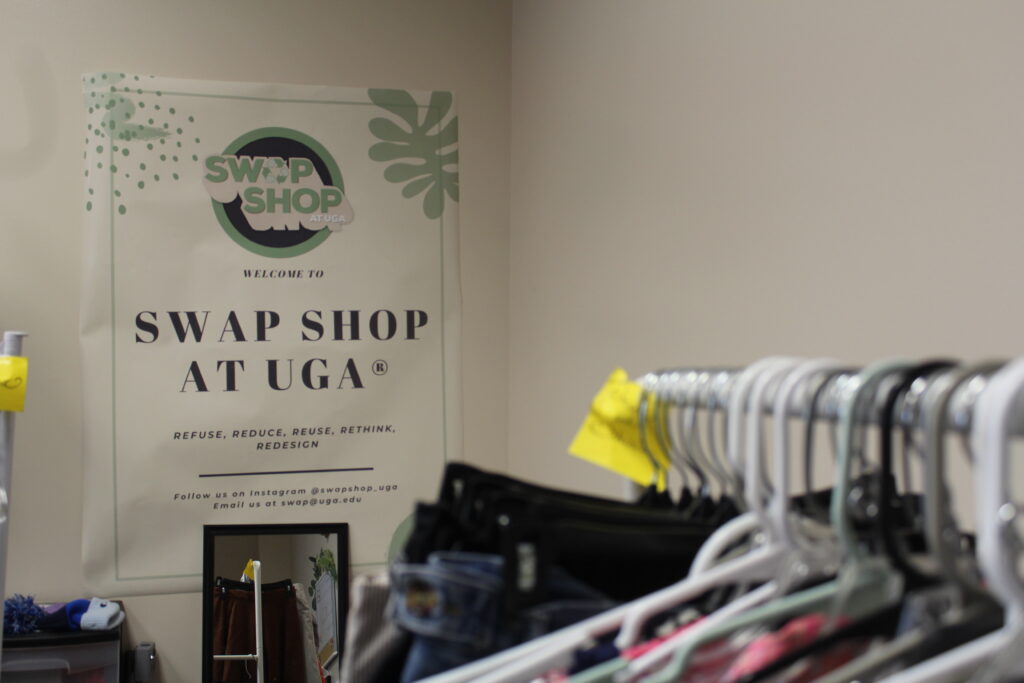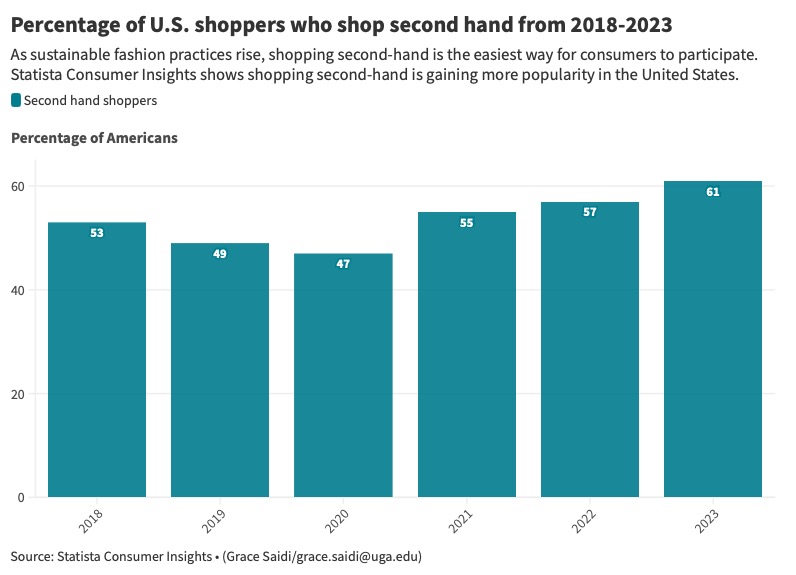University of Georgia student organizations Fair Fashion and Swap Shop are helping promote sustainable fashion practices to help reduce the amount of waste on campus.
Through clothing swaps and informational meetings, both organizations put accessibility and education at the forefront of their mission.
“I love to be able to show people that, you know, like sustainability is also about accessibility,” says Dana Theoc, director of Swap Shop. “And I think Swap Shop is a great space where we can make sustainability accessible to people.”

Student Impact on Climate Change
Fast fashion is the mass production of low-priced, trendy clothing that quickly moves from manufacturers to retail stores. According to Business Insider, 85% of all clothing ends up in a landfill.
Recent research shows Gen Z’s spending habits are still lean toward fast fashion. According to a report by online consignment shop ThreadUP, college students want to shop sustainably, but 72% purchased fast fashion clothing in 2022. Additionally, a study by the University of North Texas College of Merchandising, Hospitality & Tourism found only one in every 10 students donated their unused clothing to thrift shops, and one in every four items was thrown away.
Fair Fashion President Grace Guidera has noticed the popularity of fast fashion at UGA. She credits the high fast fashion consumption to short trend cycles, affordability and themed events like sorority date nights and holiday parties.
The fashion industry’s fast-paced nature is evident through the ever-changing trend cycles. The 20-year trend cycle used to dominate the fashion industry. According to Vice, the rise of social media and the affordability of fast fashion has allowed trends to start and end in a matter of weeks.
“I do think it’s so much more tempting to participate in that,” Guidera said. “The fact that it’s a shirt for $6. It’s just so easy to fall into that so we want to give alternatives to that.”
Fair Fashion and Swap Shop are providing students with accessible, sustainable practices, but they have to do the work to find them, said Theoc.
“Have a conversation with somebody about, you know, sustainability on campus,” Theoc said. “And I think it’s great to explore, and I would encourage people to explore sustainability so that they can realize that it’s not as inaccessible as it sometimes seems.”

Nationwide, consumers are changing their shopping patterns. Statista Consumer Insights shows more consumers are shopping second-hand. In 2023, 61% of Americans opted to shop second-hand, up 14% from 2020.
Students, Professors Changing the Tide
Professors at UGA’s College of Family and Consumer Sciences are guiding students to reconsider how they think about sustainable fashion. Sha’mira Covington understands the challenges of the fashion industry. In her classes, she uses her experiences as a former fashion professional to lead her students away from glamorizing the industry and thinking about more diverse and sustainable solutions.
“It’s not my goal to fix the ethical and sustainability issues within the fashion industry. I didn’t make them,” said Covington. “And although I can offer some suggestions, I don’t have the capacity to fix them. They started centuries and centuries ago. My goal as a fashion educator is to get people to think critically about what we’re being told.”
Hear more about how professors like Covington in UGA’s fashion merchandising program are preparing the next generation of industry professionals.
Putting Lessons into Practice
Students are not waiting to graduate to begin their careers in the sustainable fashion industry. Many UGA students are already carving their paths by starting their own clothing and jewelry businesses. The student-led, pop-up shop Couture A-La-Cart, highlights student vendors who have taken the first steps in creating their own products.
Students and faculty at the university are actively equipping themselves with the proper tools to change the industry and implement innovative practices for a more sustainable and eco-friendly future. Learn more about sustainable fashion and the industry’s effect on the environment through the quiz below.
Grace Saidi is a journalism major in the Grady College of Journalism and Mass Communication at the University of Georgia.







Show Comments (0)